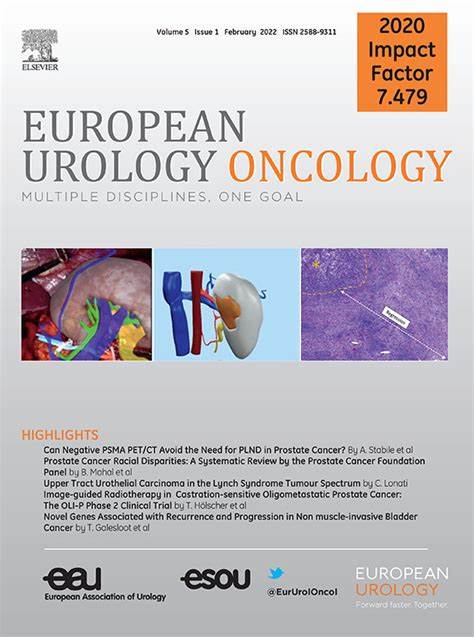PTEN缺失与挽救性放疗的不良结果有关
IF 8.3
1区 医学
Q1 ONCOLOGY
引用次数: 0
摘要
背景:挽救性放射治疗(SRT)是根治性前列腺切除术后生化复发的主要治疗手段:挽救性放射治疗(SRT)是根治性前列腺切除术后生化复发的主要治疗手段;然而,很少有研究对这种情况下的基因组生物标志物进行研究:我们研究了之前发现的有害分子表型--PTEN缺失、ERG表达和TP53突变--对接受SRT治疗的患者预后的影响:我们利用了一个包含320名SRT患者的机构数据库,这些患者都有可用的组织和随访。组织芯片用于基因验证免疫组化测定:结果测量和统计分析:单变量和多变量Cox比例危险模型评估了分子表型与SRT后无生化复发(bRFS)和无转移(MFS)生存的关系:PTEN缺失(n = 123,43%)和ERG表达缺失(n = 118,39%)在该队列中很常见,而p53过表达(表示TP53错义突变)不常见(n = 21,7%)。在单变量分析中,任何 PTEN 缺失都预示着 bRFS(危险比 [HR] 1.86;95% 置信区间 1.36-2.57)和 MFS(HR 1.89;1.21-2.94)的恶化,而同质性 PTEN 缺失与 MFS 的最高风险相关(HR 2.47;1.54-3.95)。同样,p53过表达预示着较差的bRFS(HR 1.95;1.14-3.32)和MFS(HR 2.79;1.50-5.19)。ERG表达仅与较差的MFS相关(HR 1.6; 1.03-2.48)。在调整已知预后特征的多变量分析中,同质性PTEN缺失仍可预测较差的bRFS(HR 1.82; 1.12-2.96)和MFS(HR 2.08; 1.06-4.86)。该研究因其回顾性和单机构设计而受到限制:结论:免疫组化显示的PTEN缺失是SRT治疗的前列腺癌患者bRFS和MFS的独立不良预后因素。未来的试验将确定治疗具有不良分子预后特征的 SRT 患者的最佳方法。患者总结:PTEN 肿瘤抑制蛋白的缺失与挽救性放疗后较差的预后有关,与患者的其他临床或病理特征无关。本文章由计算机程序翻译,如有差异,请以英文原文为准。
PTEN Loss Is Associated with Adverse Outcomes in the Setting of Salvage Radiation Therapy
Background
Salvage radiation therapy (SRT) is a mainstay of treatment for biochemical relapse following radical prostatectomy; however, few studies have examined genomic biomarkers in this context.
Objective
We characterized the prognostic impact of previously identified deleterious molecular phenotypes—loss of PTEN, ERG expression, and TP53 mutation—for patients undergoing SRT.
Design, setting, and participants
We leveraged an institutional database of 320 SRT patients with available tissue and follow-up. Tissue microarrays were used for genetically validated immunohistochemistry assays.
Intervention
All men underwent SRT with or without androgen deprivation therapy
Outcome measurements and statistical analysis
Univariable and multivariable Cox-proportional hazard models assessed the association of molecular phenotypes with biochemical recurrence-free (bRFS) and metastasis-free (MFS) survival after SRT.
Results and limitations
Loss of PTEN (n = 123, 43%) and ERG expression (n = 118, 39%) were common in this cohort, while p53 overexpression (signifying TP53 missense mutation) was infrequent (n = 21, 7%). In univariable analyses, any loss of PTEN portended worse bRFS (hazard ratio [HR] 1.86; 95% confidence interval 1.36–2.57) and MFS (HR 1.89; 1.21–2.94), with homogeneous PTEN loss being associated with the highest risk of MFS (HR 2.47; 1.54–3.95). Similarly, p53 overexpression predicted worse bRFS (HR 1.95; 1.14–3.32) and MFS (HR 2.79; 1.50–5.19). ERG expression was associated with worse MFS only (HR 1.6; 1.03–2.48). On the multivariable analysis adjusting for known prognostic features, homogeneous PTEN loss remained predictive of adverse bRFS (HR 1.82; 1.12–2.96) and MFS (HR 2.08; 1.06–4.86). The study is limited by its retrospective and single-institution design.
Conclusions
PTEN loss by immunohistochemistry is an independent adverse prognostic factor for bRFS and MFS in prostate cancer patients treated with SRT. Future trials will determine the optimal approach to treating SRT patients with adverse molecular prognostic features.
Patient summary
Loss of the PTEN tumor suppressor protein is associated with worse outcomes after salvage radiotherapy, independent of other clinical or pathologic patient characteristics.
求助全文
通过发布文献求助,成功后即可免费获取论文全文。
去求助
来源期刊

European urology oncology
Multiple-
CiteScore
15.50
自引率
2.40%
发文量
128
审稿时长
20 days
期刊介绍:
Journal Name: European Urology Oncology
Affiliation: Official Journal of the European Association of Urology
Focus:
First official publication of the EAU fully devoted to the study of genitourinary malignancies
Aims to deliver high-quality research
Content:
Includes original articles, opinion piece editorials, and invited reviews
Covers clinical, basic, and translational research
Publication Frequency: Six times a year in electronic format
 求助内容:
求助内容: 应助结果提醒方式:
应助结果提醒方式:


